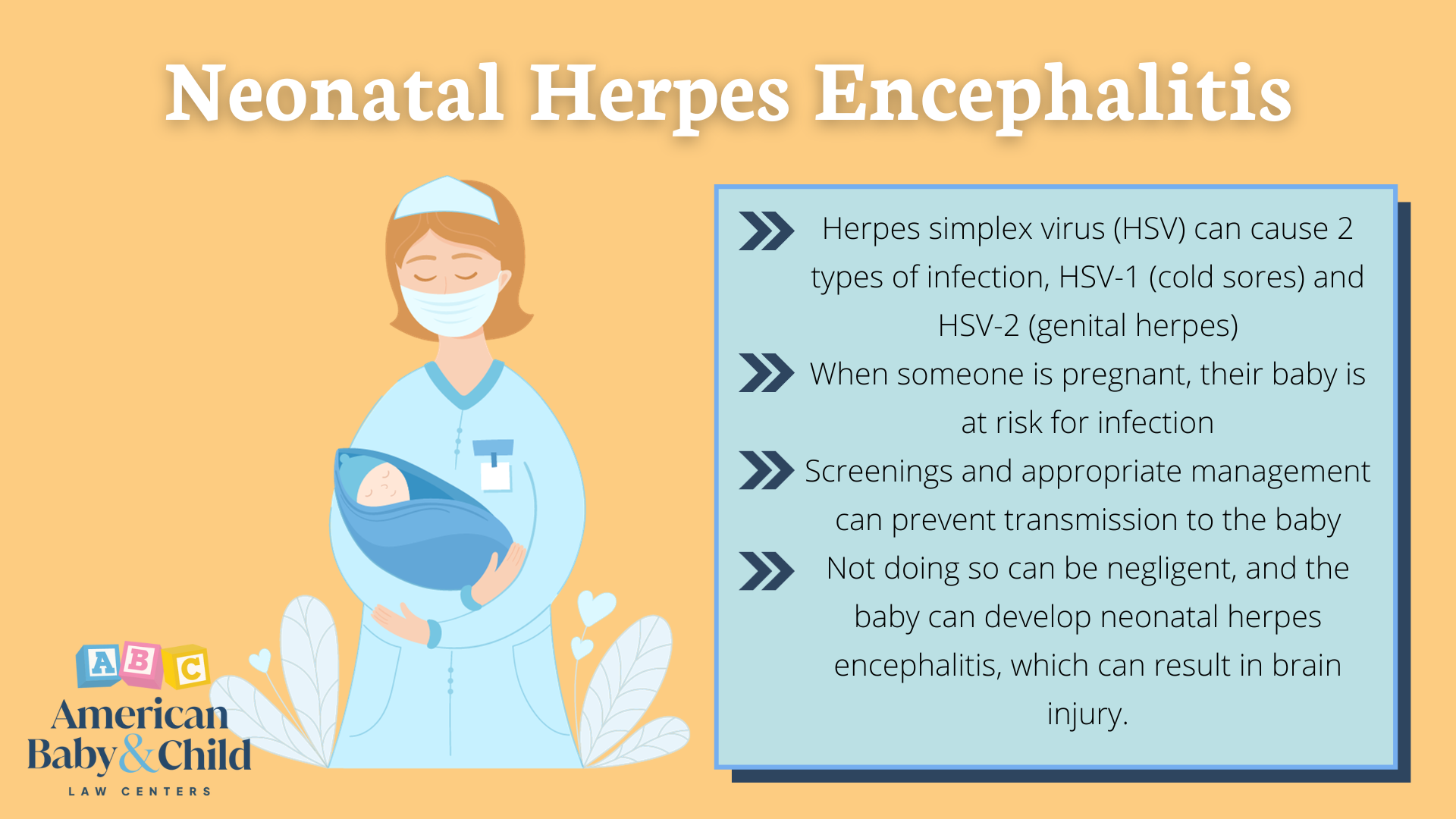Neonatal Herpes Encephalitis
Herpes simplex virus (HSV) can cause two types of infection, HSV-1–the common cause of cold sores–or HSV-2, more commonly known as genital herpes. When a pregnant person has either type of infection, their baby is also at risk for infection. Fortunately, the patient’s medical team can usually prevent transmission of HSV through screenings and appropriate management, which may include a C-section delivery and/or antiviral therapy. However, failure to take the necessary precautions to prevent neonatal herpes is negligence and can have devastating effects on the baby, including neonatal herpes encephalitis, which can result in permanent brain damage.

Types of Herpes Simplex Virus (HSV)
Of the two types of HSV, HSV-1 is the main cause of cold sores and affects the mouth, while HSV-2 mainly affects the genitals; however, both can affect either area. HSV passes from one person to another via contact. Although infected patients may have no symptoms (asymptomatic), it is also common for the infection to remain dormant with intermittent outbreaks in the form of painful, itchy sores and blisters and inflammation in the affected area. Both HSV-1 and HSV-2 can pose a severe danger to newborns when transmitted during delivery.
Causes of Neonatal Herpes Encephalitis
Most neonatal infections result from exposure to HSV in the birth parent’s genital tract during birth, although occasionally the baby may become infected earlier in pregnancy or after birth.
If a patient has primary (initial/first-time) genital HSV infection and is shedding the virus (the virus has successfully reproduced in a host cell and is spreading) late in pregnancy, they are 10-30 times more likely than a patient with a recurrent infection to transmit the virus to their baby.
Risk Factors for Neonatal Herpes Encephalitis
Risk factors for neonatal HSV include:
- First-time maternal infection in the third trimester
- Lack of HSV antibodies
- Use of invasive instruments, such as fetal-scalp electrode monitoring or forceps and vacuum extractors
- Delivery before 38 weeks
- Maternal age less than 21 years
- HSV has spread to the cervix (as opposed to only the vulva)
Signs and Symptoms of Neonatal Herpes
Neonatal herpes manifests in three main forms:
- Localized skin, eyes, or mouth (SEM) herpes
- Encephalitis: affecting the brain, with or without involvement of the skin, eyes, or mouth
- Disseminated herpes infection: affecting multiple parts of the body, including the brain (encephalitis), lungs, liver, adrenals, skin, eye, or mouth
Signs of neonatal herpes typically present between 6 and 21 days after the baby is delivered.
If neonatal herpes is suspected, doctors should look for:
- Irritability
- Lethargy
- Respiratory problems (e.g. grunting, rapid breathing, apnea)
- Feeding problems
- Blue appearance (Cyanosis)
- Yellowing of skin and eyes (Jaundice)
- Bleeding easily
- Fever
- Soft spot protruding from the baby’s head (Bulging fontanelle)
- Abnormal movements/positioning
- Seizures
- Hepatitis
- Pneumonia
- Disseminated intravascular coagulation (DIC)
Sometimes, the signs of neonatal herpes infection go unnoticed or are misattributed to another condition, such as bacterial sepsis. However, with any symptoms, like when a baby is having a seizure with no obvious underlying cause, neonatal herpes encephalitis should be considered.
Failure to promptly diagnose neonatal herpes greatly increases the seriousness of the disease and increases the chance of herpes encephalitis, permanent brain injury, and death. Neonatal herpes that is localized in the skin, eyes, or mouth is unlikely to cause permanent harm, but without prompt treatment, it may progress to the central nervous system (encephalitis) or into a disseminated disease pattern, both of which are extremely dangerous.
Diagnosis of Neonatal Herpes
A neonatal diagnosis is determined by:
- Skin culture (if the baby has a blister, medical professionals will remove a small sample of it)
- Blood or plasma test
- Swab culture (from the nose, throat, or rectum)
- Urine test
- CT scan or MRI scan
- Lumbar puncture for cerebral spinal fluid (CSF)
Treatment for Neonatal Herpes
All babies with suspected or diagnosed HSV must be treated immediately with intravenous (IV) acyclovir (Zovirax). Prompt treatment is crucial, especially in cases of disseminated infections. SEM HSV infections are treated for at least 14 days. Encephalitis or DIS infections require at least 21 days of therapy. If HSV has infected the baby’s eyes, they should also be given a topical ophthalmic solution and be seen by an ophthalmologist. Infants should also be treated for any related complications, such as seizures.
Following the initial acyclovir therapy, infants may need additional oral acyclovir suppressive therapy for six months. If the eye is affected, they may require this for longer (up to one year).
When treated promptly, babies with HSV have very good outcomes. Before antiviral therapy was widely administered, half of newborns with herpes encephalitis died within a year. Now, the one-year mortality rate has dropped to 4%. The mortality rate for disseminated disease has also dropped from 85% to 29%. Antiviral treatment has also improved outcomes for surviving neonates with disseminated herpes. Surviving infants have an 80% chance of normal brain development as opposed to the 50% chance they had before wide-spread antiviral treatment.
Preventing Neonatal Herpes
Identifying pregnant patients who have (or are at risk of having) HSV is a critical component of preventing transmission to a baby. If medical professionals suspect that a pregnant patient is infected with HSV, they should recommend viral or serologic testing to determine if they carry the infection or are producing HSV antibodies. Current recommendations of the American College of Obstetricians and Gynecologists (ACOG) do not include routine HSV screening, but patients can ask to be tested if they believe they may be at risk.
The most effective measure to prevent perinatal herpes infections is to avoid viral exposure to the baby when primary genital herpes develops in late pregnancy. When the patient has not yet developed antibodies to fight the infection, it is likely that the virus will be active in the birth canal during delivery. If a pregnant person’s partner has herpes, it is also especially important to avoid transmission during the third trimester. Doctors should recommend the use of condoms and other forms of contraception that help to prevent transmission. If the expectant person’s partner has an outbreak, it is wise to abstain from sex entirely until the baby is born since condoms are not 100% effective in preventing transmission of herpes or other STDs.
If a patient has a primary HSV outbreak during pregnancy (or active recurrent HSV), her doctor may give her oral antiviral treatment (such as acyclovir, famciclovir, or valacyclovir) to reduce the duration and severity of symptoms and viral shedding. If the infection is severe, the patient may benefit from intravenous acyclovir.
ACOG recommends Cesarean delivery (C-section) to prevent HSV transmission to the baby if the pregnant patient has active genital lesions or if the infection appears to be new (prodromal symptoms). If lesions are only found on non-genital areas, vaginal delivery may be possible. Treatment with acyclovir can reduce the need for Cesarean delivery.
If a patient with herpes delivers vaginally, there are several precautions that should be taken. Unless absolutely necessary, medical professionals should avoid the following:
- Invasive monitoring techniques, such as fetal scalp electrodes
- Use of delivery instruments (forceps and vacuum extractors)
- Artificially rupturing the fetal membranes (amniotomy)
Also, lesions near the genitals should be covered with an occlusive dressing.
Newborns born to patients with active genital lesions, with a confirmed or suspected HSV infection, should be:
- Isolated and managed with contact precautions
- Closely monitored
- Immediately treated with IV acyclovir
To prevent postnatal transmission of HSV to an infant, medical professionals should counsel family members with current or recently active lesions to take precautions around the infant. For example, those with cold sores should avoid kissing the baby, and parents who have herpes lesions on their breasts should avoid breastfeeding until the lesions are resolved.
Neonatal Herpes Encephalitis and Medical Malpractice
Listed below are issues that may constitute negligence in pregnancy, delivery, and neonatal situations involving HSV:
- Failure to diagnose HSV in a pregnant patient
- Failure to timely diagnose and treat HSV in an infant
- Failure to properly deliver the baby of an infected patient in order to avoid risks of infection in the baby. This includes failure to perform a C-section when indicated, as well as utilization of delivery instruments and other invasive tools, such as a fetal scalp electrode.
- Failure of the physician to obtain adequate informed consent, which includes advising the patient of the risks and alternatives of delivery methods, such as vaginal birth versus C-section delivery.
It is crucial that the physician take a thorough history of the pregnant patient, and this includes asking about HSV infection and risk factors. If major risk factors for or signs of HSV are present, the physician should test the patient. If a patient has HSV, all measures must be taken – and standards of care followed – in order to prevent the spread of the infection to the baby. If the baby is at risk of infection, they must be monitored closely after delivery, and if any signs of HSV are present, the baby must be treated and tested for the infection. Failure to promptly treat an infant with HSV and failure to follow the standards of care listed above constitute negligence. If this negligence leads to injury in the baby, it is medical malpractice.


Legal Help for Children Harmed by Neonatal Herpes Encephalitis
Birth injury cases are complex, both medically and legally. For the best case outcome for your child, it’s critical to find an attorney and a law firm that focus specifically on birth injury cases. At ABC Law Centers: Birth Injury Lawyers (Reiter & Walsh, P.C.), our attorneys have focused their entire careers on this area of law, and they consistently secure multi-million dollar settlements for our clients.
Contact us today to begin your free case review. We will answer your questions, help you understand where malpractice may have occurred in your child’s case, determine the negligent party, and inform you of your legal options. Moreover, you pay nothing throughout the entire legal process unless we win or favorably settle your case.
Featured Videos
Posterior Position
Hypoxic-Ischemic Encephalopathy (HIE)

Featured Testimonial
What Our
Clients Say…
After the traumatic birth of my son, I was left confused, afraid, and seeking answers. We needed someone we could trust and depend on. ABC Law Centers: Birth Injury Lawyers was just that.
- Michael
Helpful resources
- MedlinePlus – Herpes Simplex
- Understanding Risk Factors for Neonatal Herpes Can Help Prevent It
- Boston Children’s Hospital – Neonatal herpes simplex Symptoms & Causes
- Medscape – Neonatal Herpes Infection: A Review
- Neonatal herpes simplex virus infection: Clinical features and diagnosis
- Neonatal herpes simplex virus infection: Management and prevention
- Neonatal herpes encephalitis: a case series and review of clinical presentation
- Herpes & Pregnancy
The above information is meant only to be an educational resource. It is not meant to be, and should not be, interpreted as medical advice.


